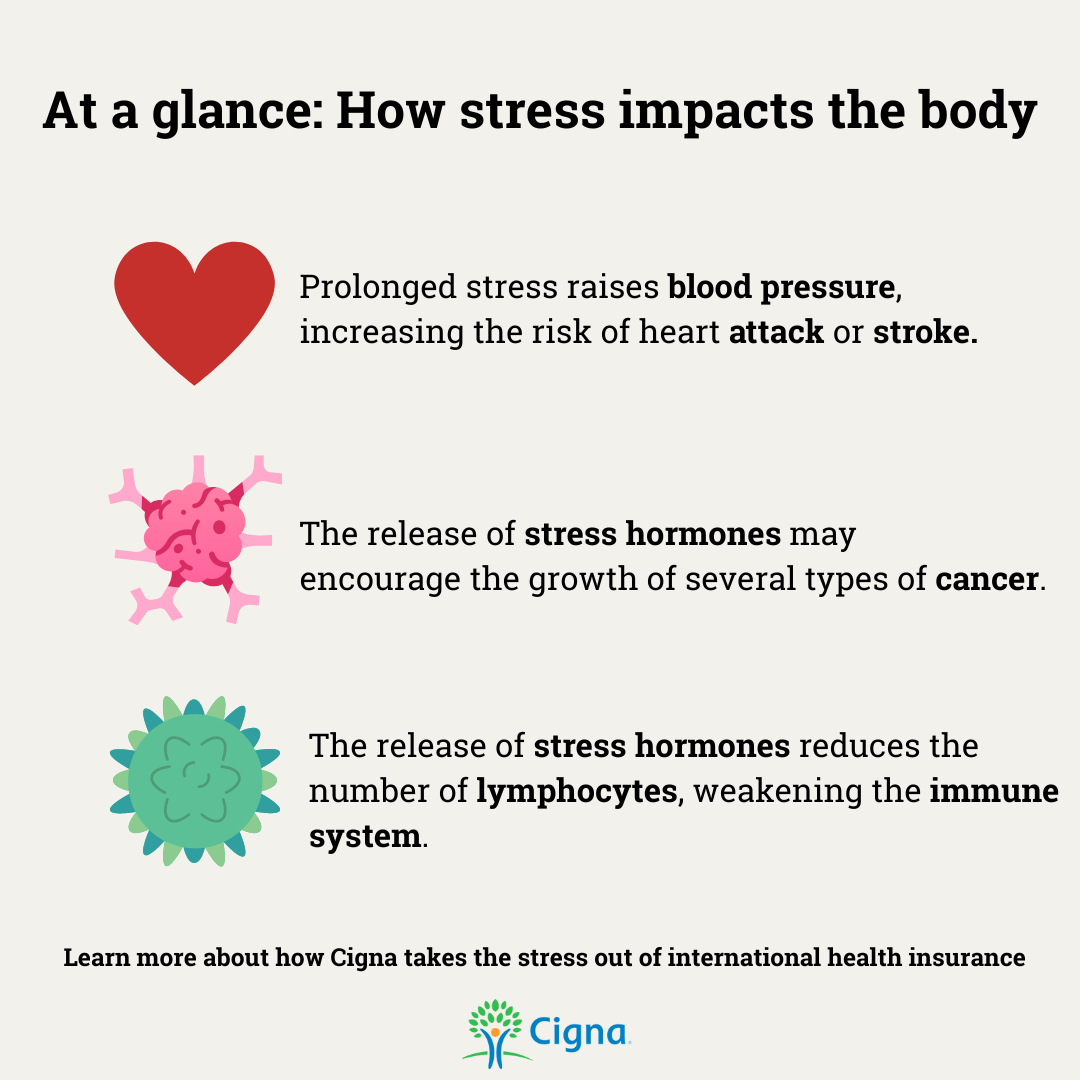Retiring overseas? Ageing, stress and how to ensure a healthy life abroad
Whether it’s a planned retirement move to a home in the sun, or a sudden desire to embrace a beloved host country for the long term, many ponder spending their ‘golden years’ living internationally.

Turning your dream of living overseas into reality can be intensely rewarding. However, it is important to understand the stresses that come with it, how stress exacerbates common health conditions, and how these can be mitigated to ensure a happy, fulfilling life.
In partnership with Cigna, we discuss the significant factors to consider before making plans to live abroad permanently.
Let’s talk about ageing
As much as we’d like to ignore the fact, as we grow older we are at greater risk of health problems. So it’s worth understanding some common conditions.
Cardiovascular Disease (CVD) is by far the biggest threat to both men and women as they age. It encompasses a range of common conditions, from strokes and heart attacks to vascular dementia. Taking the United Kingdom as an example, CVD is responsible for 160,000 deaths each year. More pressingly, it is the impact of CVD on survivors that has greater consequences – strokes are one of the leading causes of disability in the UK , with two-thirds of survivors leaving the hospital with some kind of disability.
Be prepared for the unexpected, get an international health insurance quote
Cancer is another leading threat to both men and women as they age. With the UK again as an example, 147,407 Britons died from cancer in 2020, out of an average of 375,000 new cases each year. One-third of all cancer cases were diagnosed in those over the age of 75. Breast cancer was the most common cancer diagnosed in the UK between 2016 and 2018, followed by prostate, lung and bladder cancers. While the survivability rates for many cancers are rapidly increasing, treatment and surgery does mean loss of mobility and quality of life for many patients.
Mobility issues are another serious health problem faced by many as they grow older. After the age of 40, the number of people in the UK who require assistance to move freely begins to rise exponentially. Whether caused by the degradation of joints or other, more complicated issues, a loss of mobility can limit how much of the world an individual can engage with.
While these figures may seem frightening, it’s worth remembering that medical science has led to significant increases in global life expectancy. The chances of surviving a life-threatening illness today are greater than at any point in history.
What matters, however, is quality of life. We want to enjoy our later years rather than be impaired by illness. Therefore, any factors we can identify to help us avoid developing illnesses are worth paying close attention to.
Recent research shows the surprising role stress plays in the development of age-related diseases. The good news? This is a factor we can largely control.
Stress and the human body
We’re all familiar with the sensation of being stressed – a rush of adrenalin, a flush of irritability and a pounding head.
When we're stressed, the body’s sympathetic nervous system releases adrenaline, as well as hormones such as cortisol, to spur us into a ‘fight or flight’ response, and lead us out of a dangerous situation. While this was a useful tool for our ancient ancestors, in the modern world it can do more harm than good.
Increasingly, science is uncovering the myriad effects that prolonged stress can have on the human body. We've known for a long time that stress can harm the heart and circulatory system – prolonged stress can lead to a more rapid heartbeat and higher blood pressure, doubling the chances of having a heart attack or stroke.
Research has also uncovered the role of stress in the development of many kinds of cancer. It indicates that the brain's release of hormones during periods of prolonged stress can activate cancer cells, leading to rapid tumour growth.
Stress also impacts the body's immune system. When a person experiences prolonged stress, hormones again can significantly reduce the number of lymphocytes, a kind of white blood cell, weakening the body's defences against infection.
So, for most of us, if we can reduce stress in our daily lives, we can lessen our chances of falling ill. There are a number of techniques, practices and habits that can help reduce the effect of stress. For people living overseas, however, this may be more of a challenge.
Stress and living abroad
The experience of living abroad carries with it its own stressors.
Chief among these are communication difficulties. A lack of understanding of language and cultural mores can be a constant source of stress for internationals, in particular when it comes to resources that may be needed, such as healthcare.
A lack of access to friendly support networks can also be a major stressor. A significant proportion of expats are individuals, so asking for help or having interactions may be difficult. Making friends can take time, and bring its own anxieties.
Finally, there may be financial pressures – particularly for retirees, who likely have finite savings. Sudden disruptions to their lifestyle could mean a costly return to their home country, or a reduction in circumstances – in itself a major stressor.
 Stretch yourself: Staying active and connected to others can help vastly reduce stress levels. Photo: Getty Images
Stretch yourself: Staying active and connected to others can help vastly reduce stress levels. Photo: Getty ImagesThe most important consideration for older internationals
As increasing numbers of people work, live and retire abroad, international health insurers are beginning to understand the role of stress for policyholders – in both recovery and prevention. Most insurers now actively address the stress experienced by internationals abroad through their coverage.
Chiefly, many providers, such as Cigna Global, offer unlimited phone and online consultations with doctors, with clinical advice and prescriptions in the customer's language. They also grant access to specialists and choice of hospitals within their network, giving clients peace of mind when it comes to serious illness.
Insurance providers, like Cigna Global, are also developing benefits tailored toward specific conditions, such as cancer. In such cases, in addition to treatment, telephone counselling and other disease-related costs, such as those for a wig, may be included. This provides needed support during a crisis, minimising the damage done by stress and boosting the chances of a full recovery.
Finally, depending on the level of coverage, some insurers have deployed the use of dedicated services to give their policyholders advice on all areas of life abroad – from rubbish collections to family emergencies. A friendly voice acting as a guide means that many stressors faced by internationals can be minimised, if not eliminated.
If you are planning to make a permanent move abroad, especially if you're getting older, it's important to consider how a potential insurer addresses the challenges of living abroad, and how it actively helps tackle stress.
It is worth asking exactly what is offered in an international health insurance policy, beyond the coverage it has for illness and accidents. Does it offer consultations with a doctor in your language? What about counselling services? How will the policy offset the stresses of life abroad daily?
Important for retirees to know, if joining Cigna Global before the end of August, the company will upgrade their policy to include the highly-valued Vision and Dental add-on module for one year*, that covers eye tests, eyewear and a wide range of preventative, routine and major dental treatments.
Enjoying your later years abroad can be a hugely rewarding and fulfilling experience. To make the most of it, make sure you invest in a policy that not only covers you for when you're ill but also helps you stay fit, healthy and free of stress in the first place.
* - The free Vision and Dental policy upgrade is only applicable to new policies sold in August 2022 which will be eligible for 1 year free Vision and Dental cover. Premiums under $2k will not be eligible. Not applicable in conjunction with any other offer or discount.
This content was paid for by an advertiser and produced by The Local's Creative Studio.


Join the conversation in our comments section below. Share your own views and experience and if you have a question or suggestion for our journalists then email us at [email protected].
Please keep comments civil, constructive and on topic – and make sure to read our terms of use before getting involved.
Please log in here to leave a comment.